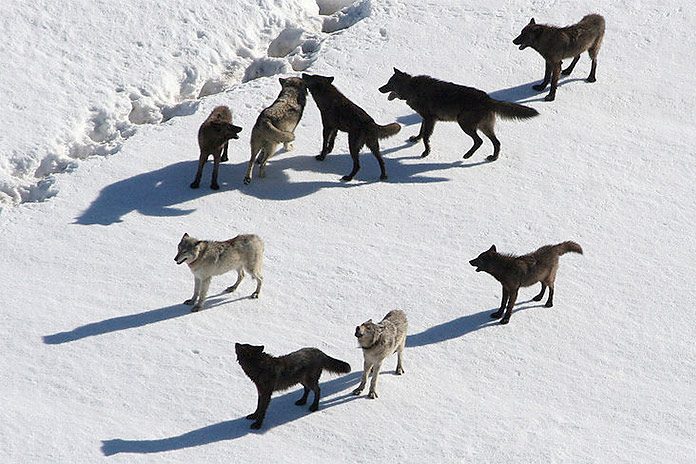
Eastern Oregon is now in Phase III of wolf management after Oregon Department of Fish & Wildlife staff documented a third year of seven or more breeding pairs in the region east of U.S. Highways 97, 20, 395 for year 2016.
A “breeding pair” is two adult wolves that produce at least two pups that survive through the end of the year. The eight packs that qualify as breeding pairs in 2016 are Meacham and Walla Walla (Umatilla County), Catherine (Union County), and Snake River, Chesnimnus, Wenaha, Minam and a group of unnamed wolves in the Imnaha Wildlife Management Unit (Wallowa County).
“Moving into Phase III is a significant milestone towards the recovery of gray wolves in Oregon,” says Russ Morgan, ODFW wolf biologist. “It shows how successful wolves can be in this state – in just nine years under existing management we have gone from no packs of wolves to multiple packs and an expanding distribution.”
In addition to counting wolves, ODFW biologists have placed 14 radio-collars on wolves this winter in seven groups. Another milestone was reached on Feb. 24 when OR50 was collared in the Imnaha Wildlife Management Unit, marking the 50th wolf collared in Oregon. Biologists may soon learn more from the DNA and radio-collar data about whether OR50 is part of a new group of wolves or a pack that shifted its home range into the area previously occupied by the Imnaha pack.
ODFW completes its annual year-end survey of wolves and announces the results in its 2016 Wolf Annual Report. The report is set to be presented to the Oregon Fish and Wildlife Commission on April 21 in Klamath Falls.
The current Plan allows either ODFW or USDA Wildlife Services to confirm wolf depredations in Eastern Oregon. The Plan also allows USDA Wildlife Services to continue to assist ODFW with wolf damage management using the skills and experience of both agencies. Lethal removal of wolves for specific cases of chronic depredation will be decided by ODFW and will continue to be based on a rigorous evidence-based investigation process. USDA Wildlife Services will not assist in the lethal removal of wolves or expand its role in depredation investigations (including confirming wolf depredations) until it has evaluated its obligations under the National Environmental Policy Act.








